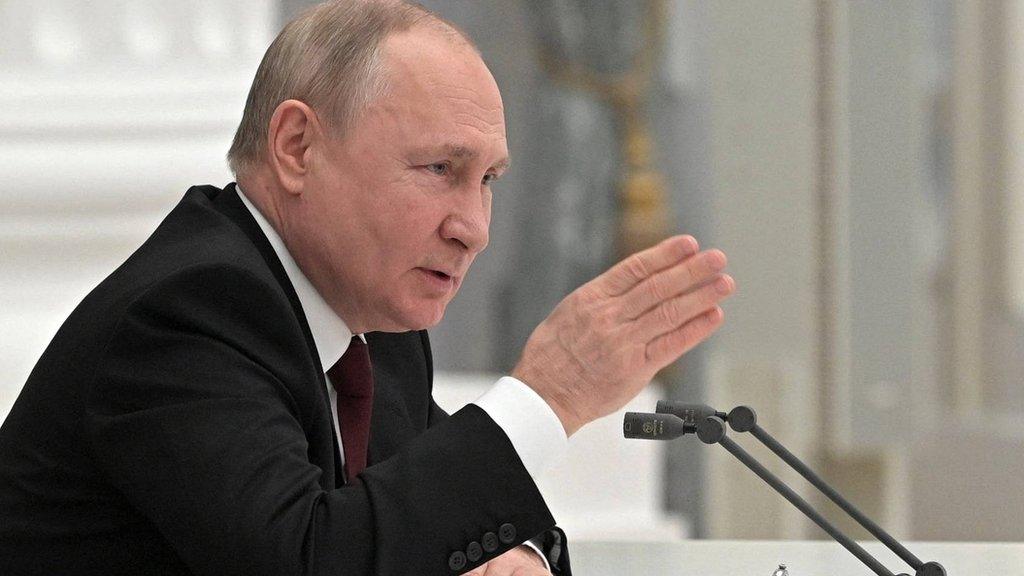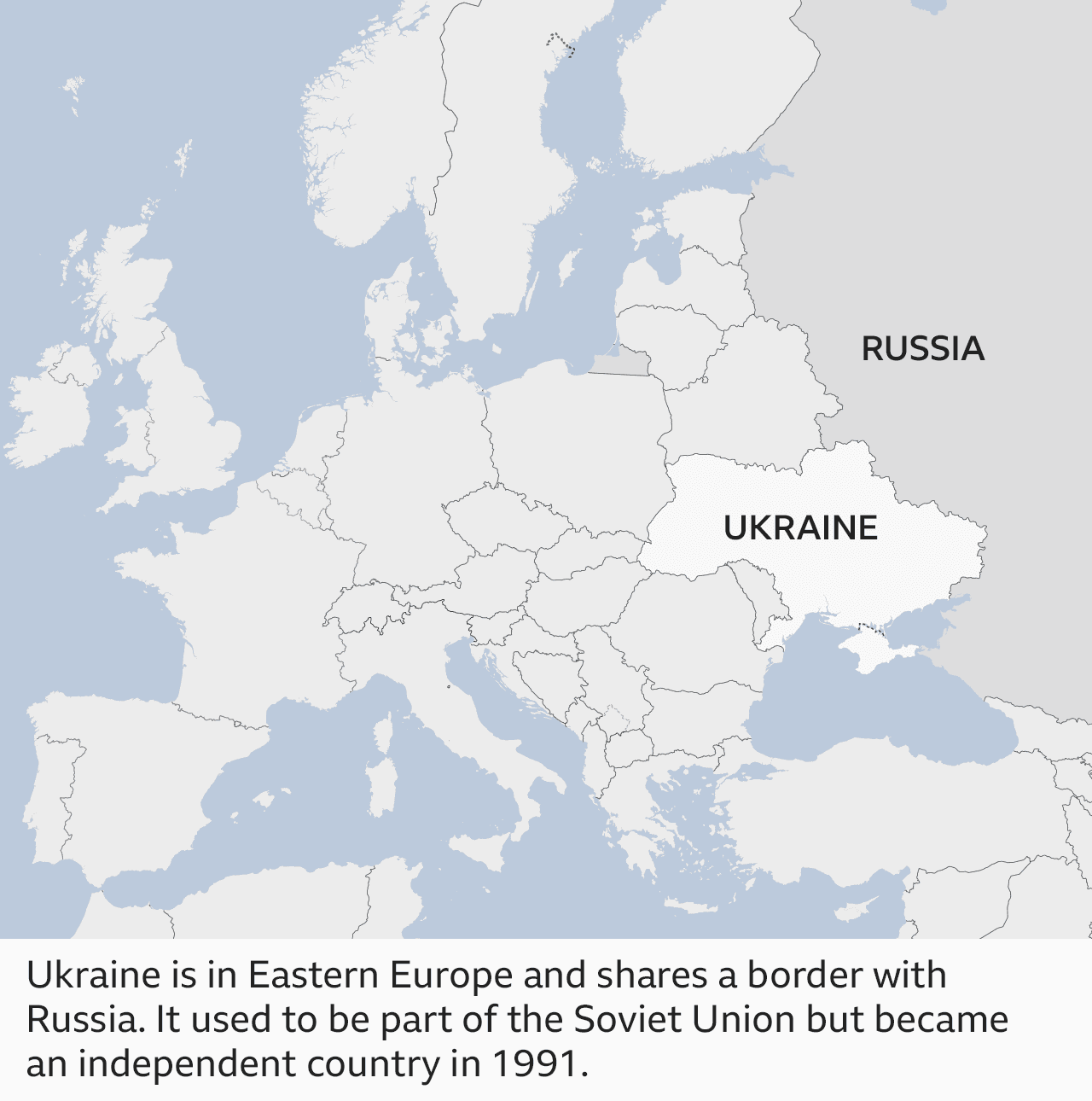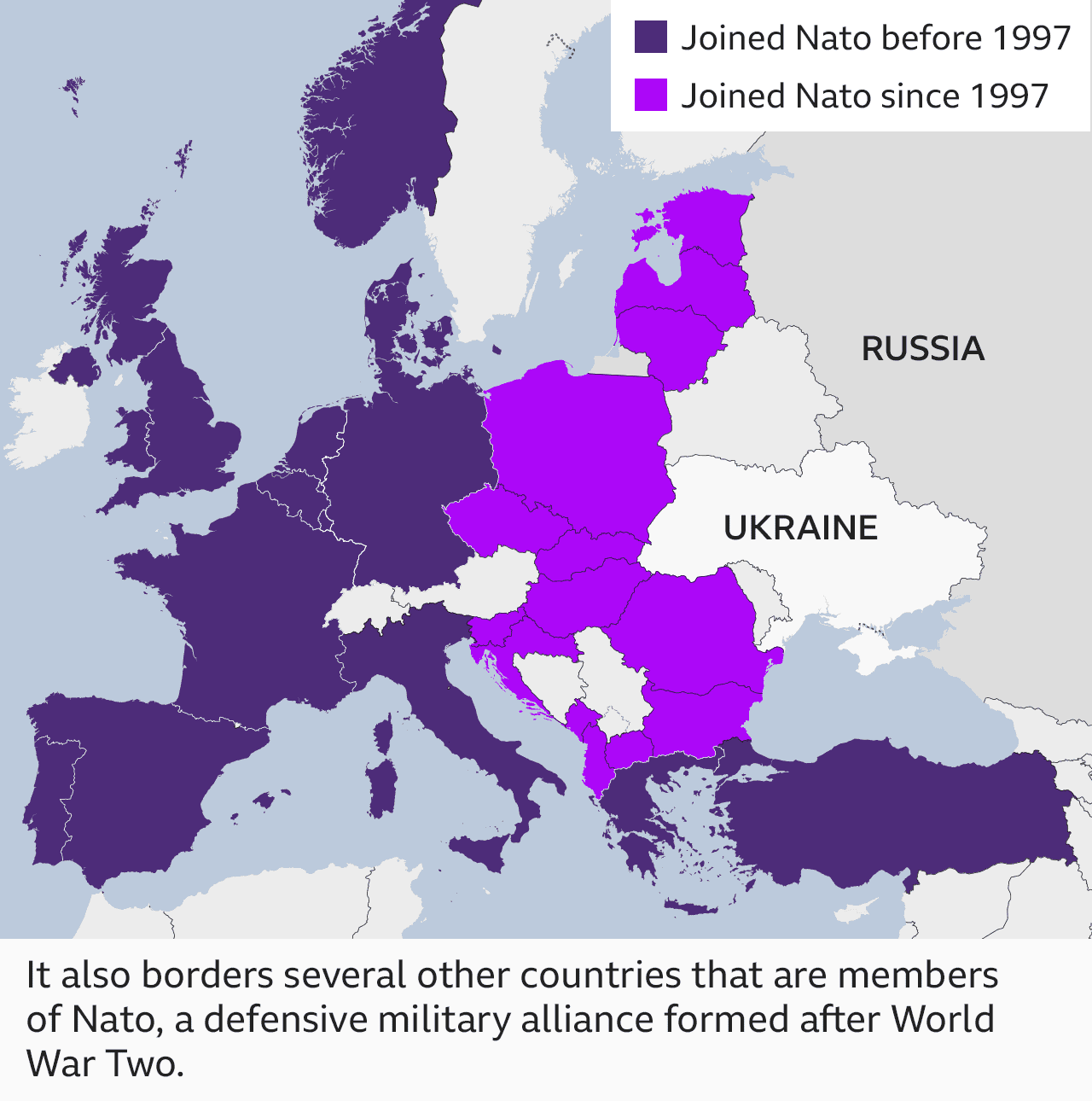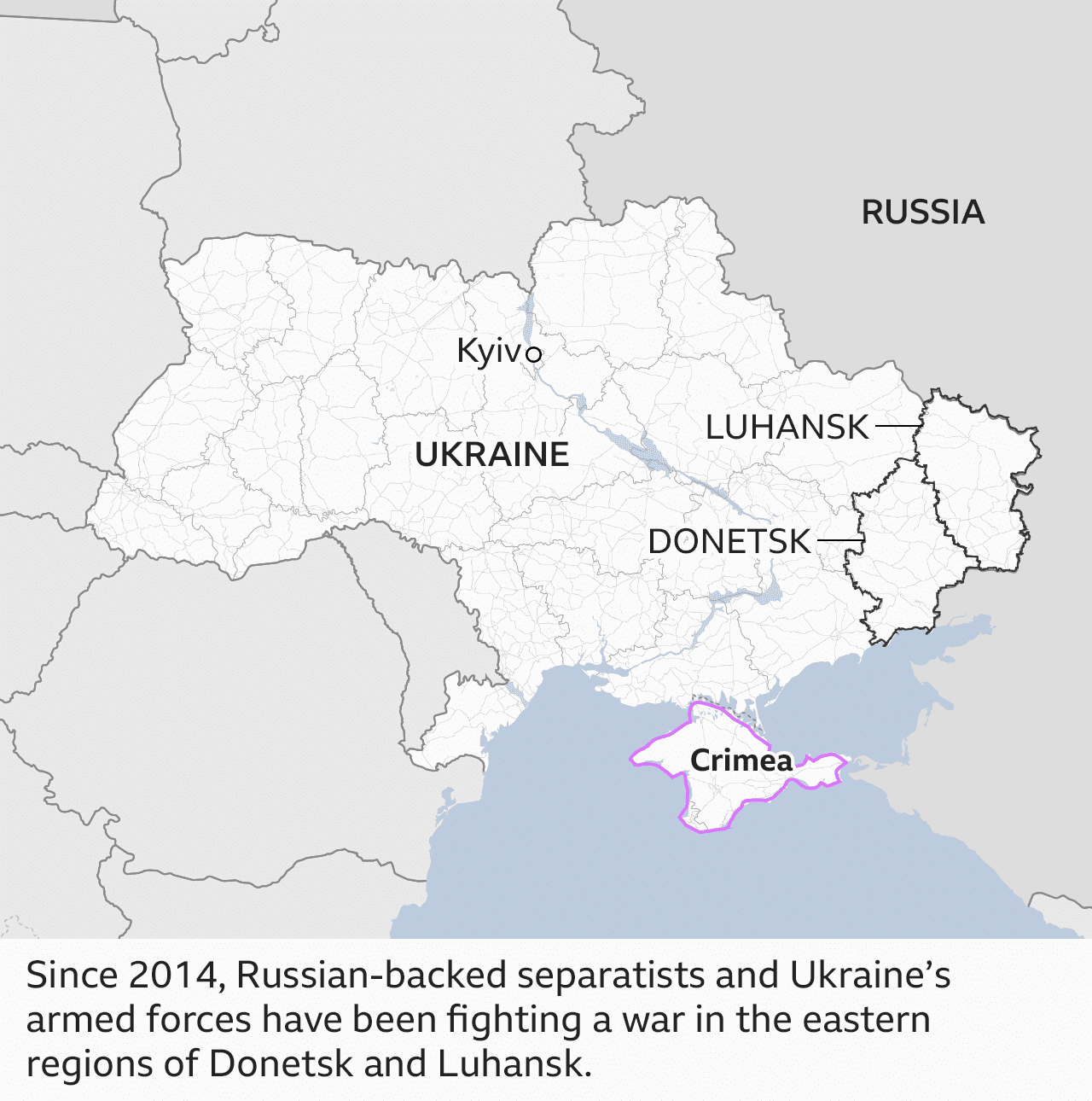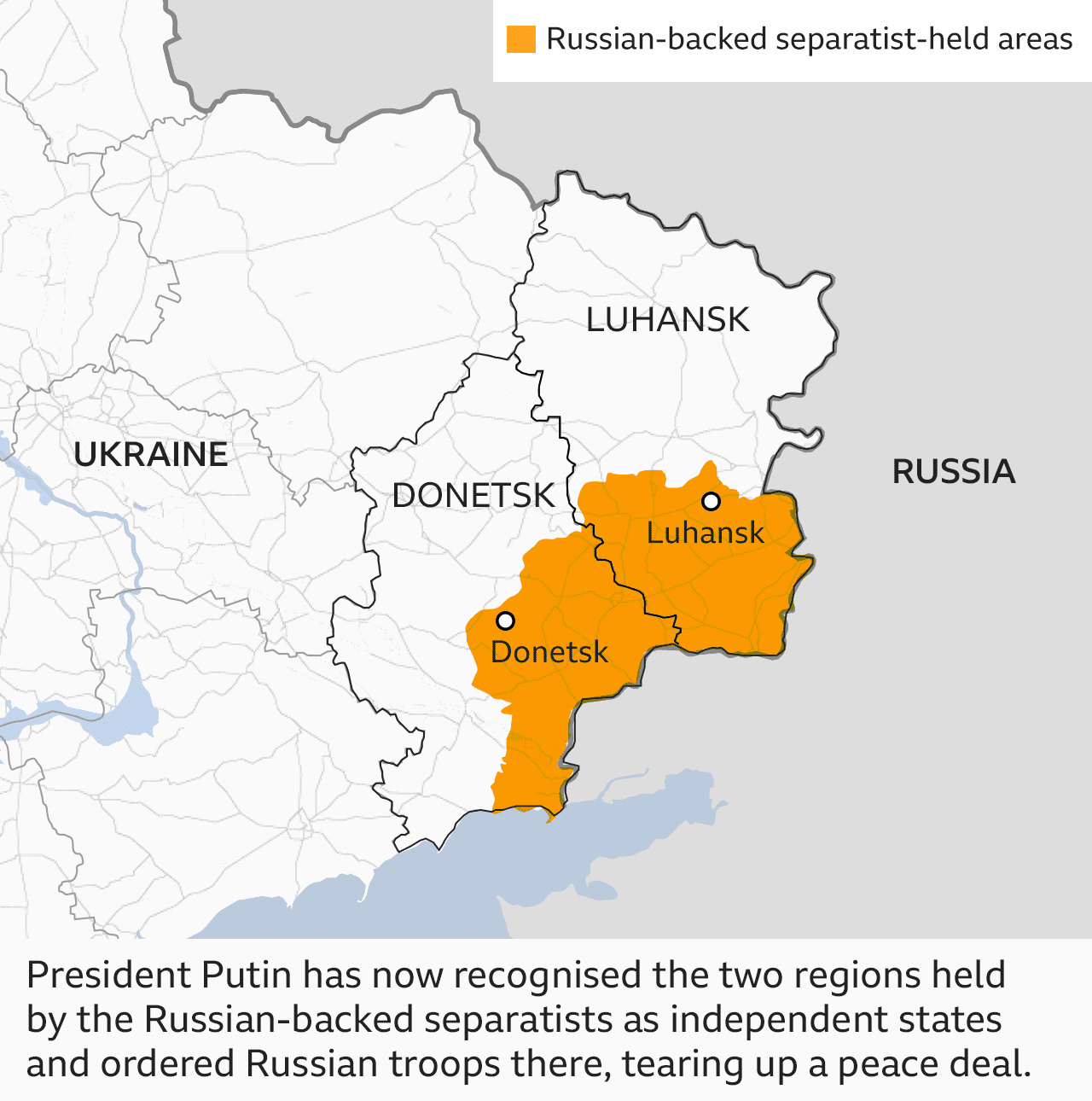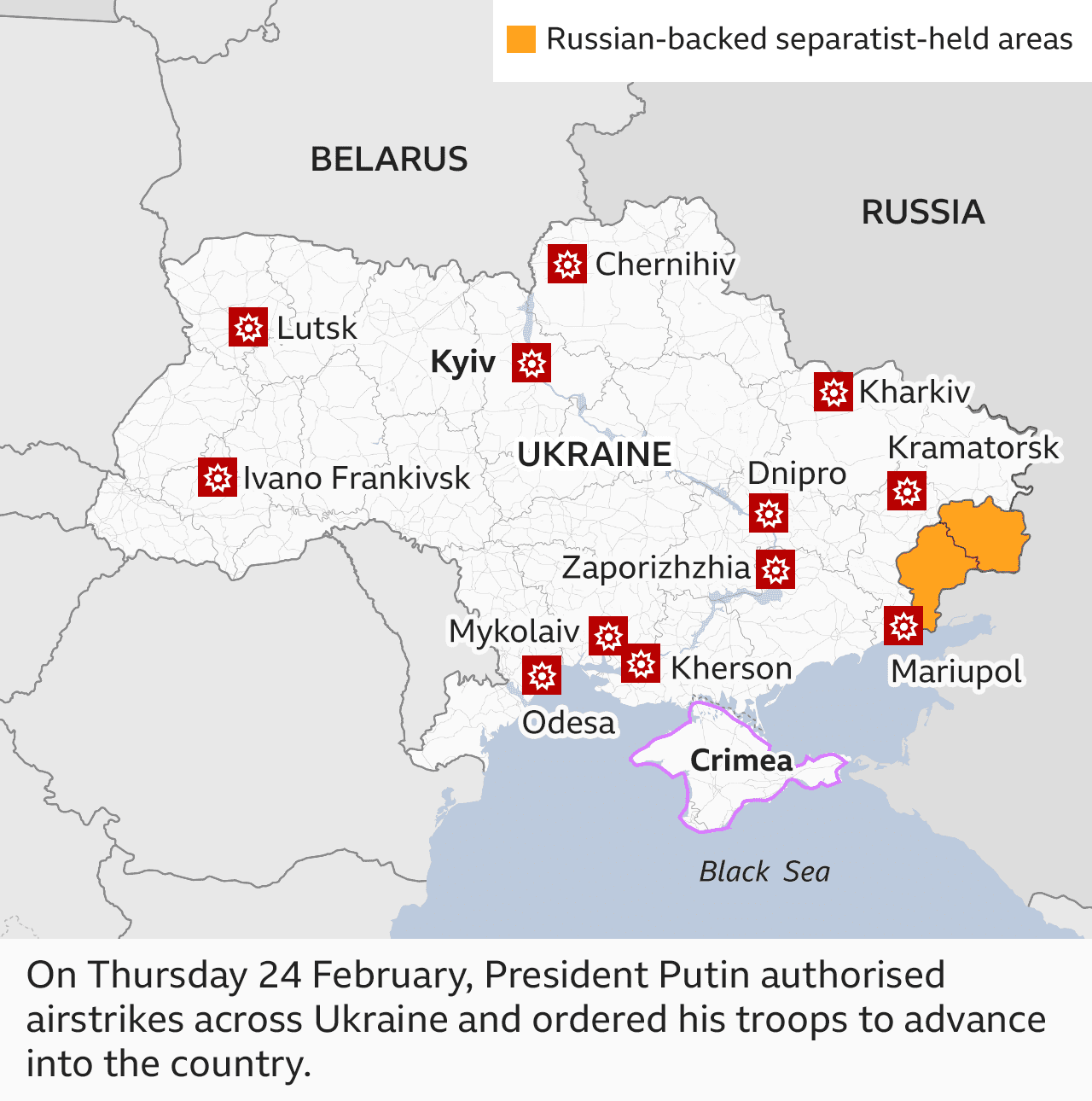Ukraine conflict: Russian forces attack from three sides
- Published
WATCH: Footage from Ukraine shows explosions, a missile strike and a helicopter under fire
Russian forces have launched a major assault on Ukraine, firing missiles on cities and military targets.
The invasion by land, air and sea began after a pre-dawn TV address where Russian President Vladimir Putin demanded that Ukraine's military lay down its arms.
Initial reports of casualties included Ukrainian civilians and soldiers, and Russian troops.
Ukraine's leader said his country "won't give up its freedom".
"Russia has embarked on a path of evil, but Ukraine is defending itself," President Volodymyr Zelensky tweeted.
Ukraine has declared martial law and severed all diplomatic relations with Russia. It says weapons will be given to anyone who wants them.
In the capital Kyiv, home to almost three million people, warning sirens blared out as traffic queued to leave the city and crowds sought shelter in metro stations. "We don't understand what we should do now," one woman called Svetlana told the BBC. "We're now going to a place where we can be safe and we hope we can leave safely."
Mark, a 27-year-old sales executive, said he was ready to be called up to fight. "We don't have another way," he said.
Several neighbouring countries have begun preparations to take in a large number of refugees. Moldova alone said more than 4,000 people had come over the border from Ukraine.
THE BASICS: What does Putin want?
EXPLAINER: What sanctions are being imposed on Russia?
Thursday's invasion followed weeks of escalating tensions, as Russia massed troops along Ukraine's borders.
The UK, EU and other Western allies have vowed to impose tough new sanctions to punish Moscow, but say they will not send in troops.
"These are among the darkest hours of Europe since the Second World War," EU foreign affairs chief Josep Borrell said.
Dozens of people have been killed, including about 10 civilians. Six died in an air strike in Brovary near the capital Kyiv. A man was also killed in shelling outside the major north-eastern city of Kharkiv.
A Ukrainian presidential adviser said that more than 40 soldiers had died and many more were wounded. Ukraine said it had killed 50 Russian troops and shot down six Russian aircraft, but this has not been verified.
What Russia has targeted
Mr Zelensky said Russia had positioned almost 200,000 troops and thousands of combat vehicles on Ukraine's borders ahead of Thursday's invasion.
Moscow first struck Ukraine's military infrastructure and border guard units. Then Ukrainian forces said Russian military vehicles had crossed the border near Kharkiv in the north, Luhansk in the east, Russian-annexed Crimea in the south and from Belarus too. Belarus's authoritarian leader Alexander Lukashenko said his country's military were not involved but could be if needed.
Russian tanks were later seen on the outskirts of Kharkiv, a city of 1.4 million people. Russian forces also reportedly landed by sea at Ukraine's major port cities of Odesa on the Black Sea and Mariupol on the internal Sea of Azov.
Much of the fighting appears to be centred around the east.
Residents of Kharkiv, Ukraine's second largest city, say windows in apartment blocks were shaking from constant blasts as the Ukrainian military and Russian forces exchanged shellfire.
But clashes have have also been taking place around the capital Kyiv in the north and the southern ports of Odesa and Mariupol.
Ukraine's army said Kyiv's Boryspil international airport was among a number of airfields that had been bombed, along with military headquarters and warehouses in the big cities of Kyiv, Dnipro, Kharkiv and Mariupol.
Footage verified by the BBC showed missiles slamming into an airport in the western city of Ivano-Frankivsk.
Russia claimed to have destroyed more than 70 military targets.
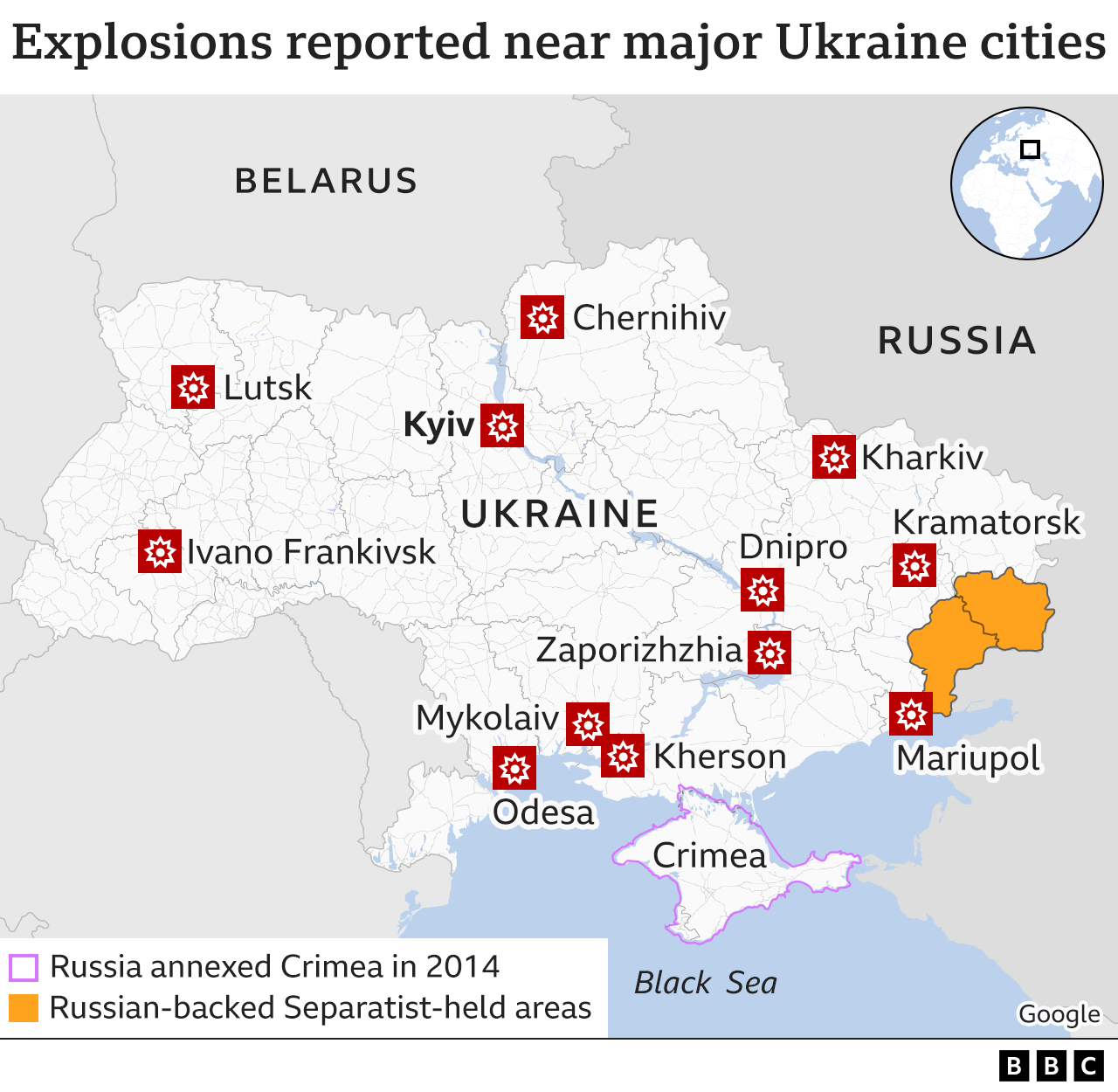

'Unprovoked and unjustified'
The Russian leader launched the "special military operation" by repeating a number of unfounded claims he has made this week, including alleging that Ukraine's democratically elected government had been responsible for eight years of genocide.
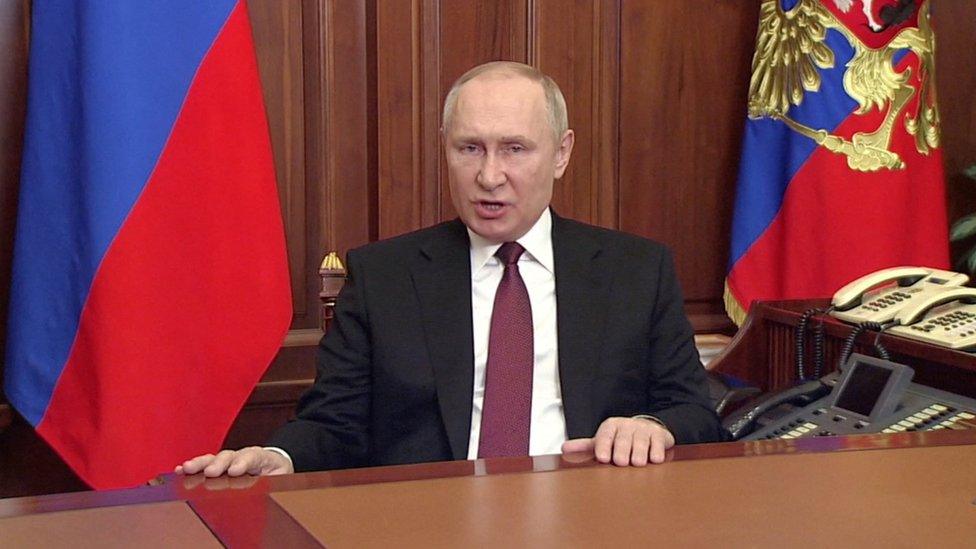
President Putin announced the military attack on Ukraine in a pre-recorded TV address
He said the goal was demilitarisation and "denazification" of Ukraine. Hours earlier Ukraine's president had asked how a people who lost eight million of its citizens fighting Nazis could support Nazism. "How could I be a Nazi?" said Mr Zelensky, who is himself Jewish.
Mr Putin also warned that any outside power intervening on Ukraine's behalf would face an "instant" response.
Neighbouring countries have reacted to the crisis.
In the Baltic republic of Estonia, which borders Russia, Prime Minister Kaja Kallas said a number of Nato allies that shared borders with Russia had agreed to launch consultations, external under Nato's Article 4. Under the defensive alliance's treaty, Nato can be brought together if any member fears their independence or territory is under threat.
"Russia's widespread aggression is a threat to the entire world and to all Nato countries," she said.
As cars queued on Ukraine's border with Moldova, the country's pro-EU president, Maia Sandu said she was declaring a state of emergency and was prepared to give help to tens of thousands of Ukrainians. Lithuanian President Gitanas Nauseda also said he was signing a state of emergency to be approved by parliament.
"President Putin, in the name of humanity, bring your troops back to Russia," said UN Secretary-General António Guterres.
Ukraine's Western allies had repeatedly warned that Russia was poised to invade, despite repeated denials from Moscow. The US, EU, UK and Japan imposed sanctions against leading Russians, Russian banks and MPs who backed the move.
In a televised address, UK Prime Minister Boris Johnson said that the "hideous and barbaric venture by Vladimir Putin must end in failure".
Addressing Russians, he said: "I cannot believe this is being done in your name, or that you really want the pariah status it will bring to the Putin regime." He told Ukrainians that the UK was "on your side".
US President Joe Biden said the world would hold Russia accountable. He is expected to address Americans on Thursday about consequences Russia will face.
France's President Emmanuel Macron said the attack would have "deep, lasting consequences for our lives".
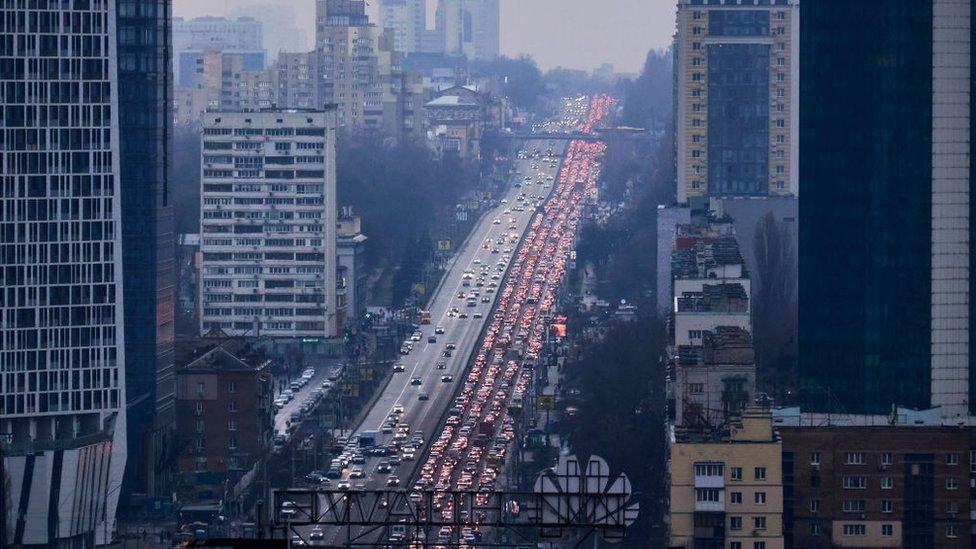
There are long queues as Kyiv residents try to leave
Why Russia invaded
Earlier this week Russia's president announced he was recognising the independence of two self-proclaimed people's republics of Donetsk and Luhansk in eastern Ukraine.
The breakaway regions were seized by Russian-backed rebels after Russia invaded Crimea in 2014. Mr Putin launched that attack after mass street protests in Ukraine that ousted pro-Russian President Viktor Yanukovych.
Since then more than 14,000 people have died in the east in a conflict between the rebels and Ukrainian forces. A shaky ceasefire had held but there has been a surge in violations in recent days.
Mr Putin said the military operation's objective was to defend the people in the breakaway areas.
Kyiv and its Western allies have repeatedly rejected as absurd Mr Putin's claims that Ukraine was being run by neo-Nazis, instead pointing out that Ukraine was now a nation with growing democratic institutions, unlike an authoritarian Russia.
Fears of a Russian attack have been rising for months.
Mr Putin has repeatedly accused the US and its allies of ignoring Russia's demands to prevent Ukraine from joining the Nato military alliance and offer Moscow security guarantees.

Are you in Ukraine? Are you or your family affected? Email haveyoursay@bbc.co.uk, external.
Please include a contact number if you are willing to speak to a BBC journalist. You can also get in touch in the following ways:
WhatsApp: +44 7756 165803
Tweet: @BBC_HaveYourSay, external
Please read our terms & conditions and privacy policy
If you are reading this page and can't see the form you will need to visit the mobile version of the BBC website to submit your question or comment or you can email us at HaveYourSay@bbc.co.uk, external.
- Published23 February 2022
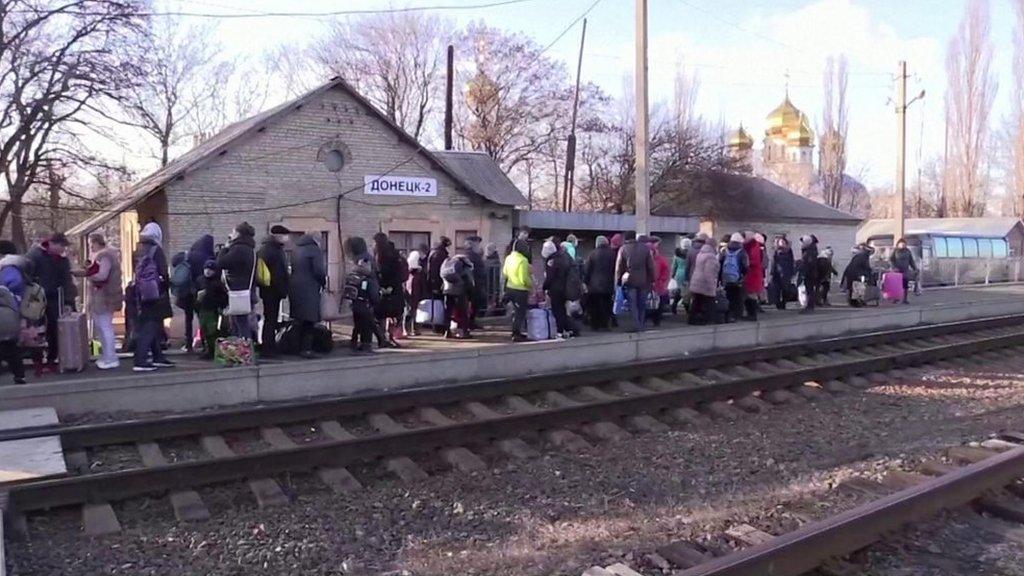
- Published23 February 2024
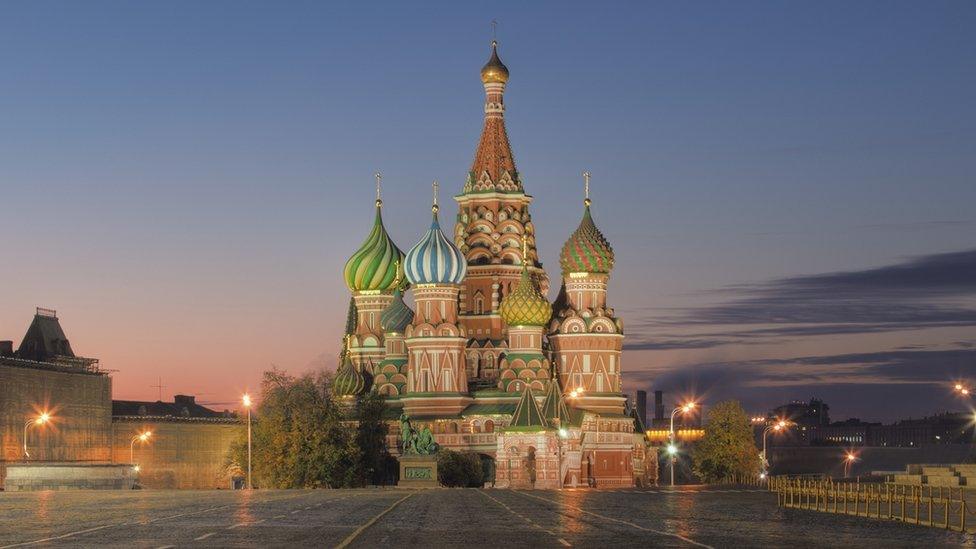
- Published24 February 2023
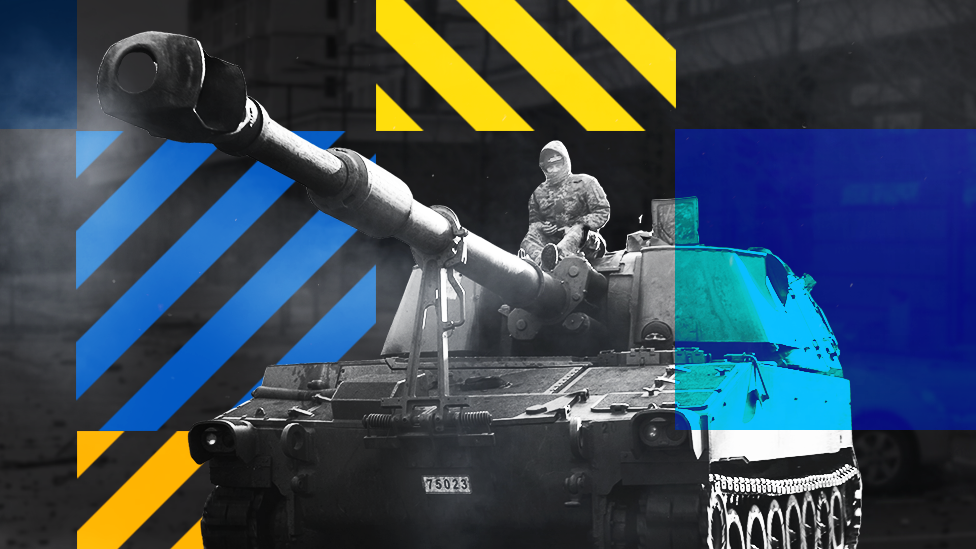
- Published22 February 2022
